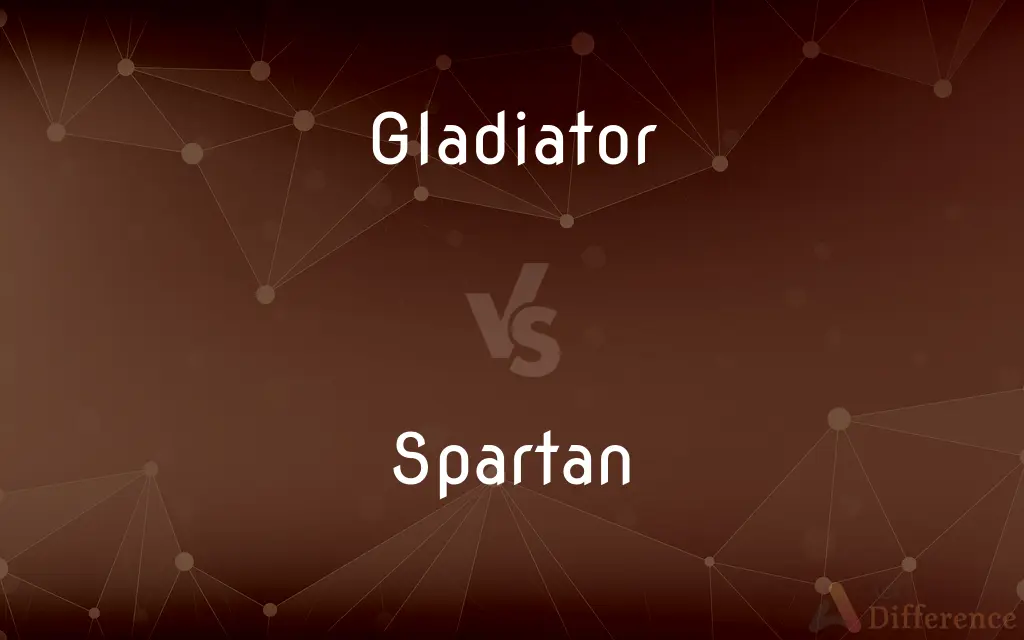Gladiator vs. Spartan — What's the Difference?
By Fiza Rafique & Urooj Arif — Updated on March 24, 2024
Gladiators were entertainers in ancient Rome who fought in arenas, while Spartans were citizen-soldiers of the ancient Greek city-state of Sparta, known for their military prowess.

Difference Between Gladiator and Spartan
Table of Contents
ADVERTISEMENT
Key Differences
Gladiators, originating in ancient Rome, were fighters who entertained public audiences by engaging in armed combat, in large arenas such as the Colosseum. Their battles were a form of entertainment and could include fights against other gladiators, wild animals, or condemned criminals. On the other hand, Spartans were the citizen-soldiers of Sparta, an ancient Greek city-state renowned for its military strength and societal emphasis on martial prowess. From a young age, Spartan males were trained for combat, valuing discipline, endurance, and skill in warfare above all else.
While gladiators could be slaves, prisoners of war, or volunteers seeking fame and fortune, Spartan warriors were born into their role, with citizenship and the rights associated with it contingent upon completion of their military training and service. Whereas gladiatorial combat was a career or a sentence, being a Spartan soldier was a lifelong commitment, integral to one's identity and status within the Spartan society.
Gladiatorial games were a key part of Roman culture, serving not only as entertainment but also as a means of displaying the power and generosity of the elite, who sponsored the games. In contrast, the Spartan way of life was centered around the agoge, the rigorous education and training program designed to instill in the youth the skills and values necessary for becoming effective soldiers and citizens, highlighting the communal rather than the individualistic aspect of their society.
The armor and weapons of gladiators varied widely, designed to increase the spectacle and entertainment value of their fights. They were often mismatched in terms of equipment to make the contests more interesting. Spartans, however, were known for their uniformity in arms and armor, most notably the hoplite shield, spear, and helmet, emphasizing unity and cohesion in battle.
While both gladiators and Spartans hold iconic places in history for their combat skills, the contexts within which they fought were vastly different: one as entertainment and the other as a societal obligation. Gladiators fought individual or small group battles primarily for the entertainment of others, often without a choice in the matter, while Spartans trained as part of a citizen-army, with a focus on discipline and unity, prepared to defend their city-state and its values.
ADVERTISEMENT
Comparison Chart
Origin
Ancient Rome
Ancient Sparta, Greece
Role
Entertainers in armed combat
Citizen-soldiers
Training
Varied, based on type of gladiator and origin
Rigorous, lifelong military training from a young age
Status
Slaves, prisoners of war, volunteers
Free citizens with rights contingent on military service
Purpose
Entertainment, political propaganda
Defense of city-state, embodiment of societal values
Equipment
Varied for spectacle, often mismatched
Uniform, designed for cohesion and effectiveness in battle
Social Context
Individualistic, often seen as lower social status
Integral to identity and status within Spartan society
Combat Context
Arena battles for public entertainment
Military engagements in defense of Sparta and its territories
Compare with Definitions
Gladiator
Entertainers in ancient Rome who fought in public spectacles.
The gladiator prepared to face his opponent in the Colosseum.
Spartan
Service was expected of all male citizens.
The Spartan's life was dedicated to serving his city-state.
Gladiator
Engaged in fights against other gladiators, animals, or criminals.
As a gladiator, he once fought a lion.
Spartan
Known for their phalanx formation and teamwork.
The Spartans' strength lay in their disciplined unity.
Gladiator
Gladiators remain symbols of the Roman entertainment culture.
Today, gladiators are romanticized in films and literature.
Spartan
Underwent the agoge for comprehensive military and social education.
From a young age, the Spartan was trained to endure hardship.
Gladiator
Included slaves and those seeking fame.
Some gladiators volunteered, hoping for glory and riches.
Spartan
Spartans are epitomized for their austere lifestyle and military prowess.
The Spartans' way of life inspires modern concepts of discipline and resilience.
Gladiator
Fights were designed for public enjoyment.
The gladiator's victory was met with roaring approval from the crowd.
Spartan
Citizen-soldiers of Sparta, known for military discipline.
The Spartan was revered for his bravery and skill in battle.
Gladiator
A gladiator (Latin: gladiator, "swordsman", from gladius, "sword") was an armed combatant who entertained audiences in the Roman Republic and Roman Empire in violent confrontations with other gladiators, wild animals, and condemned criminals. Some gladiators were volunteers who risked their lives and their legal and social standing by appearing in the arena.
Spartan
Of or relating to Sparta or its people.
Gladiator
A person, usually a professional combatant, a captive, or a slave, trained to entertain the public by engaging in mortal combat with another person or a wild animal in the ancient Roman arena.
Spartan
Rigorously self-disciplined or self-restrained.
Gladiator
A person engaged in a controversy or debate, especially in public; a disputant.
Spartan
Simple, frugal, or austere
A Spartan diet.
A spartan lifestyle.
Gladiator
(Sports) A professional boxer.
Spartan
Marked by brevity of speech; laconic.
Gladiator
A person (professional or slave) who entertained the public by engaging in mortal combat with another, or with a wild animal.
Spartan
Courageous in the face of pain, danger, or adversity.
Gladiator
(by extension) A disputant in a public controversy or debate.
Spartan
A citizen of Sparta.
Gladiator
A professional boxer.
Spartan
One of Spartan character.
Gladiator
To fight as entertainment for others.
Spartan
Austere, frugal, characterized by self-denial.
I went on the retreat to the monastery, thinking I would be sleeping in a spartan cell, only to discover a simple but comfortable bedroom.
Gladiator
To compete in a public contest.
Spartan
Lacking in decoration and luxury.
After ten years as a fashion designer in the rough-and-tumble Garment District, Eloise left New York for the spartan but serene life of a farmer's wife.
Gladiator
To debate or argue.
Spartan
Of or pertaining to Sparta, especially to ancient Sparta; hence, hardy; undaunted; as, Spartan souls; Spartan bravey.
Gladiator
To act aggressively toward others.
Spartan
A resident of Sparta
Gladiator
Originally, a swordplayer; hence, one who fought with weapons in public, either on the occasion of a funeral ceremony, or in the arena, for public amusement.
Spartan
Of or relating to or characteristic of Sparta or its people
Gladiator
One who engages in any fierce combat or controversy.
Spartan
Resolute in the face of pain or danger or adversity;
Spartan courage
Gladiator
(ancient Rome) a professional combatant or a captive who entertained the public by engaging in mortal combat
Spartan
Unsparing and uncompromising in discipline or judgment;
A parent severe to the pitch of hostility
A hefty six-footer with a rather severe mien
A strict disciplinarian
A Spartan upbringing
Gladiator
A professional boxer
Spartan
Practicing great self-denial;
Be systematically ascetic...do...something for no other reason than that you would rather not do it
A desert nomad's austere life
A spartan diet
A spartan existence
Common Curiosities
Could a gladiator earn his freedom?
Yes, some gladiators were granted freedom after achieving significant victories or upon retirement.
How were gladiators trained?
Gladiators underwent specialized training in schools, where they learned various fighting techniques and strategies.
Did Spartans engage in combat outside of wartime?
Spartans trained continuously for war but did not fight purely for entertainment like gladiators.
Were gladiators always slaves or prisoners?
Not always; some volunteered, attracted by the potential for fame, wealth, or social advancement.
What was the Spartan women's role in society?
Spartan women were expected to maintain physical fitness, run households, and were relatively more independent compared to women in other Greek city-states.
Did gladiators fight to the death in every battle?
Not every fight ended in death, though it was common. Spectacles often aimed for bloodshed, but skilled gladiators could survive multiple battles.
How did Spartan society view military service?
Military service was the highest duty and the basis of a male Spartan's identity and status within the community.
Was it possible for a Spartan to refuse military service?
Refusing military service was unthinkable for a Spartan male, as it would lead to ostracism and loss of citizenship rights.
What was the significance of the agoge for Spartans?
The agoge was crucial for instilling discipline, loyalty, and military skills, ensuring every male citizen could contribute effectively to Spartan society.
What kind of legacy have the Spartans and gladiators left in modern culture?
Both are celebrated in modern media for their bravery and skill; Spartans for their discipline and military prowess, gladiators for their courage and role in entertainment.
Share Your Discovery

Previous Comparison
More vs. Much
Next Comparison
Sensitivity vs. SpecificityAuthor Spotlight
Written by
Fiza RafiqueFiza Rafique is a skilled content writer at AskDifference.com, where she meticulously refines and enhances written pieces. Drawing from her vast editorial expertise, Fiza ensures clarity, accuracy, and precision in every article. Passionate about language, she continually seeks to elevate the quality of content for readers worldwide.
Co-written by
Urooj ArifUrooj is a skilled content writer at Ask Difference, known for her exceptional ability to simplify complex topics into engaging and informative content. With a passion for research and a flair for clear, concise writing, she consistently delivers articles that resonate with our diverse audience.















































